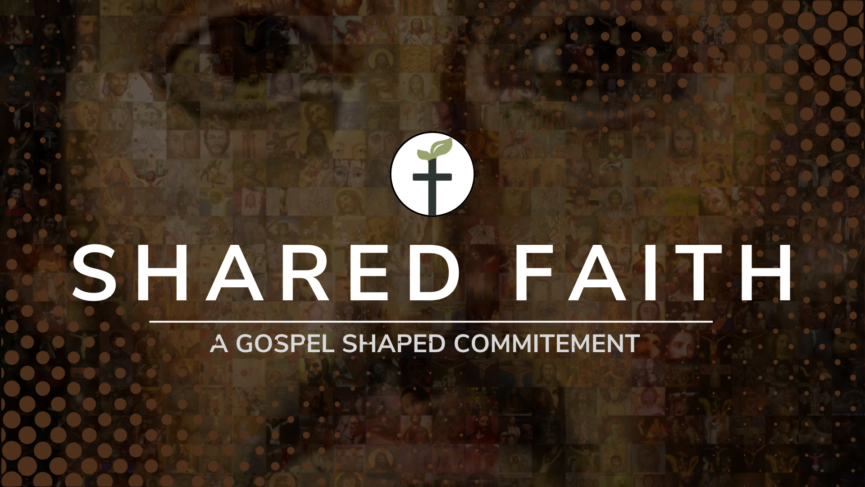SHARED FAITH
Last Sunday we began a deep dive into our core values here at ‘The Gathering’ (TG) by beginning to explore what it might mean to have a shared faith. A helpful way to begin to pick this apart is by asking questions like, ‘what do we mean by faith’? ‘What, or who is our faith in’? ‘Who do we share this faith with’? ‘Do we just share it with those in TG or do we share it with other churches’? ‘Do we all believe the same things and does it matter’? These are important and complex questions but I want to begin to sketch out an answer to them with a series of blogs over the next couple of weeks. I guess that at the heart of this question of a shared faith is the idea of what has traditionally been known as ‘Christian orthodoxy’.
What is Orthodoxy?
As I mentioned on Sunday, you might find yourself having an intially negative response to this term for it one that often sits uncomfortably in modern Western culture.1 For some people orthodoxy might be associated with an oppressive and authoritarian demand for compliance at the expense of silencing minority voices. For others it might draw up a sense of repression and restriction that hinders freedom of thought and expression, or it might just all sound a bit dull and dry, a kind of intellectual or academic term that is far removed from the practical realities of life. Whilst there might be legitimate reasons for holding these views, I want to challenge them and suggest that the orthodox christian worldview is the most exciting, the most challenging, the most liberating, and the most relevant truth claim that exists.
But what does the word actually mean? Well, the word ‘orthodoxy’ itself is made up of two smaller Greek words, ‘orthos’ and ‘doxa’, which I will briefly examine it turn before offering my own definition.
Orthodoxy = Orthos + Doxa
So, if we begin with ‘orthos’, the word means ‘straight’, ‘right’, or ‘true’ and it is where we get words like ‘orthodontist’ for the straightening of teeth, ‘orthopaedics’ for the right aligning of bones and joints, and ‘orthontics’ for the straightening of twisted limbs. In each of these cases, as Bishop Graham Tomlin has pointed out, ‘”ortho-’ indicates the straightening of something that has become broken or malformed’.2 The second word, ‘doxa’ has often been understood to mean ‘belief’ and so orthodoxy meant ‘right belief’, but a better, and more accurate translation, is something like ‘glory’ or ‘worship’. Therefore a more faithful translation might be something like ‘right worship’. However, even this definition is quite a limited one for as Andrew Walker points out, ‘right belief…is inconceivable apart from right worship and right action’3 and ‘knowing the truth of Christianity is no mere conceptual knowledge but is a knowledge embodied in a way of life – a life of worship and holy living’.4
In light of this I want to offer a definition of Christian orthodoxy as the rightful re-aligning of our thoughts and lives with the truth of God as an act of worship
‘Christian Orthodoxy is the rightful re-aligning of our thoughts and lives with the truth of God as an act of worship’.
Where sin has distorted our beliefs, our ethics, and our worship, Christian orthodoxy seeks to realign and straighten them out. The basic arguement of this series is that whilst there is quite a bit of room for disagreement amongst Christians on certain topics, there are also essential core truths that are non-negotiable that have been passed down from generation to generation and that we are now responsible to steward and pass on ourselves. But how can can we tell the difference between what we can disagree on and what are the core non-negotiable elements? It is to this question that we will turn in the next few blogs but, at this point, you might be asking yourself why we need to have this discussion at all, why do we need to draw lines and boundaries, can’t we all just get along?

To answer this we might just point to how lines and boundaries are essential for group identity and definition. To be part of a family is to be part of a particular group of people and not another, to support a particular football team is to give my support to them and not another, to be belong to a particular political group is to give my allegiance to them and not another. It would make no sense for me to say that I support Liverpool if I wear a Man United shirt, attend only Arsenal games, buy a season ticket for Newcastle, and only cheer when Everton win! To say that you support a certain club implies that you are giving your loyalty to that club and, by implication, not to others. To reject this premise is to hollow out any meaning to the sense of what it means to support the club and the same is true for any community for ‘there is always a limit to what any group can tolerate without being torn apart’.5
What is true of communities is also true of religious claims as well for to affirm one thing is also, logically, to negate another. As Thomas Oden puts it, ‘serious truth claims require clear denials’.6 But, we live, Oden suggests, in an age of what he calls ‘hyper-toleration’ where ‘unlimited tolerance is one of the controlling myths’ and where ‘we are mesmerised by the misconception that freedom opposes all limits’.7 This ‘misconception’, that freedeom opposes all limits, is one that we will return to in the other blogs in this series but it is worth noting the irony in the position of the rejection of truth’s boundaries and freedom’s limits, for as soon as you say something like, ‘there is no truth’ or ‘there are no boundaries’, you are affirming the truth of the statement and establishing a boundary.
Another Gospel?
The church may have a chequered past when it comes to how it has stewarded the truth and protected these boundaries (the Inquisition anyone), but this does not mean that they are not important. For instance, in a passage that we will return to throughout this series, Paul uses incredibly strong language to urge the believers in Galatia to stay faithful to the true gospel and not to embrace another false one. In the opening of his letter he says, ‘I am astonished that you are so quickly deserting the one who called you in the grace of Christ and are turning to a different gospel— not that there is another gospel, but there are some who are confusing you and want to pervert the gospel of Christ. But even if we or an angel from heaven should proclaim to you a gospel contrary to what we proclaimed to you, let that one be accursed! As we have said before, so now I repeat, if anyone proclaims to you a gospel contrary to what you received, let that one be accursed’! (Gal. 1:6-9).

If anyone, anyone at all, should make a claim about the truth of the gospel that stood at odds with what Paul and others had been preaching then they rightfully stand accursed! This is obvioulsy no small matter for Paul and as Andrew Clarke has pointed out Paul ‘becomes most categoric, dogmatic, and insistent on those occasions where he is defending the gospel. He has no autonomy regarding the scope or content of the message. He cannot and will not change it nor will he countenance others doing so’.8
Just what that gospel is and how we know, will be the focus of the next few posts.
- For the following responses to the term ‘orthodoxy’ see Tomlin, Navigating, chp. 1. ↩︎
- Tomlin, Navigating, chp. 1. ↩︎
- Walker, Deep, 66. ↩︎
- Walker, Deep, 64. ↩︎
- Belcher, Deep, Chp. 3. ↩︎
- Oden also says that ‘Heresey is what orthodoxy is not’. Oden, Rebirth, 127. ↩︎
- Oden, Rebirth, 131. ↩︎
- Clarke, ‘Source‘, 14. ↩︎

